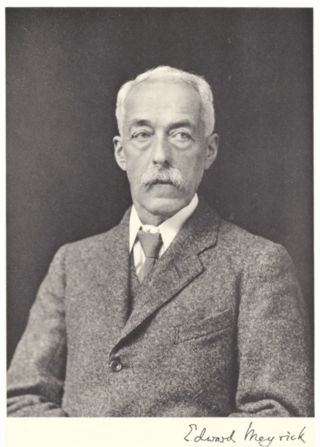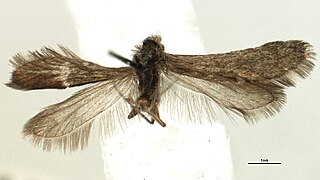Related Research Articles

Edward Meyrick was an English schoolmaster and amateur entomologist. He was an expert on microlepidoptera and some consider him one of the founders of modern microlepidoptera systematics.

Heterobathmia is a genus of Lepidoptera. It is the only genus in the suborder Heterobathmiina, as well as in the superfamily Heterobathmioidea and in the family Heterobathmiidae. Primitive, day-flying, metallic moths confined to southern South America, the adults eat the pollen of Nothofagus or southern beech and the larvae mine the leaves. Most known species are undescribed.

Lophocoronoidea is a superfamily of insects in the order Lepidoptera. There is a single extant genus, Lophocorona, in the family Lophocoronidae. These are small, primitive nocturnal moths restricted to Australia whose biology is largely unknown.
Sir George Francis Hampson, 10th Baronet was an English entomologist.

Urodidae, whose species are commonly known as false burnet moths, is a family of moths in the lepidopteran order. It is the type genus in the superfamily, Urodoidea, with three genera, one of which, Wockia, occurs in Europe.
Metachanda is the sole genus in tribe Metachandini of moth subfamily Oecophorinae. Metachandini was originally described as family Metachandidae by Edward Meyrick in 1911, and at the time also contained the genus Chanystis, which is currently unplaced to tribe within Oecophorinae. It has also previously been described as tribe Metachandini of subfamily Gelechiinae.
Agathiphaga is a genus of moths, known as kauri moths. It is the only living in the family Agathiphagidae. This caddisfly-like lineage of primitive moths was first reported by Lionel Jack Dumbleton in 1952, as a new genus of Micropterigidae.
Herbert Druce, FLS was an English entomologist.

Sematurinae is a subfamily of moths in the family Sematuridae represented by at least 29 species in the Neotropics.

George Talbot FES was an English entomologist who specialised in butterflies. He wrote about 150 scientific papers, the majority being primarily systematic, consisting of the description of new species or the revision of various genera. He was also responsible for the curation and preservation of the Joicey collection of Lepidoptera prior to its accession by the Natural History Museum.

The Thyatirinae, or false owlet moths, are a subfamily of the moth family Drepanidae with about 200 species described. Until recently, most classifications treated this group as a separate family called Thyatiridae.

Diphtherinae is a monotypic subfamily of moths in the family Nolidae erected by Michael Fibiger and J. Donald Lafontaine in 2005. Its only genus, Diphthera, was erected by Jacob Hübner in 1809. The genus was moved from Noctuidae in 2013 after the phylogenetic analysis of Reza Zahiri et al. (2013).
Afrophyla is a monotypic moth genus in the family Geometridae described by Warren in 1895. Its only species, Afrophyla vethi, was first described by Snellen in 1886. It is found in eastern Africa.

Blepharoctenucha is a monotypic moth genus in the family Geometridae described by Warren in 1895. Its only species, Blepharoctenucha virescens, first described by Arthur Gardiner Butler in 1880, is known from India and Taiwan.
Celonoptera is a monotypic moth genus in the family Geometridae. Its only species, Celonoptera mirificaria, is found in south-eastern Europe. Both the genus and species were first described by Julius Lederer in 1862.

Cyme sexualis is a moth of the subfamily Arctiinae first described by Felder in 1864. It is found on Ambon, Sulawesi, the Dampier Archipelago. and in New Guinea.

Thermozephyrus ataxus, the wonderful hairstreak, is a small butterfly found from India to Japan that belongs to the lycaenids or blues family.
Phaneroctena spodopasta is a moth in the family Cosmopterigidae. It was described by Alfred Jefferis Turner in 1923. It is found in Australia, where it has been recorded from Queensland.
References
- ↑ Beccaloni, G.; Scoble, M.; Kitching, I.; Simonsen, T.; Robinson, G.; Pitkin, B.; Hine, A.; Lyal, C., eds. (2003). "Phaneroctena homopsara". The Global Lepidoptera Names Index . Natural History Museum . Retrieved May 12, 2018.